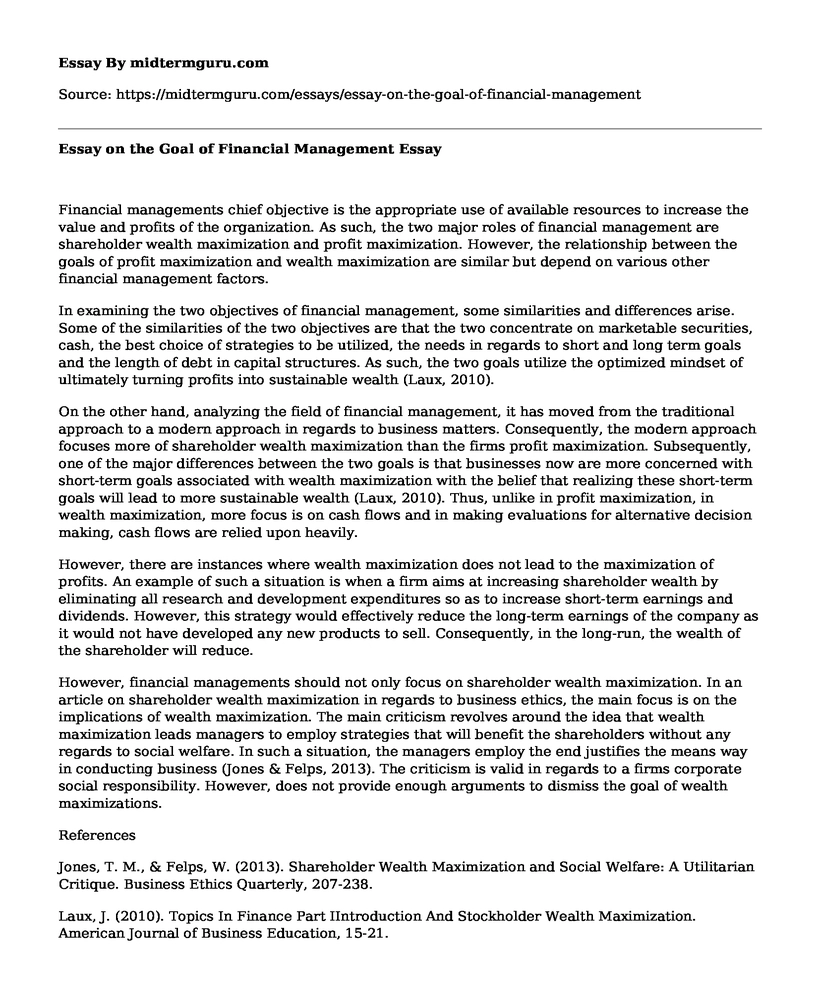Financial managements chief objective is the appropriate use of available resources to increase the value and profits of the organization. As such, the two major roles of financial management are shareholder wealth maximization and profit maximization. However, the relationship between the goals of profit maximization and wealth maximization are similar but depend on various other financial management factors.
In examining the two objectives of financial management, some similarities and differences arise. Some of the similarities of the two objectives are that the two concentrate on marketable securities, cash, the best choice of strategies to be utilized, the needs in regards to short and long term goals and the length of debt in capital structures. As such, the two goals utilize the optimized mindset of ultimately turning profits into sustainable wealth (Laux, 2010).
On the other hand, analyzing the field of financial management, it has moved from the traditional approach to a modern approach in regards to business matters. Consequently, the modern approach focuses more of shareholder wealth maximization than the firms profit maximization. Subsequently, one of the major differences between the two goals is that businesses now are more concerned with short-term goals associated with wealth maximization with the belief that realizing these short-term goals will lead to more sustainable wealth (Laux, 2010). Thus, unlike in profit maximization, in wealth maximization, more focus is on cash flows and in making evaluations for alternative decision making, cash flows are relied upon heavily.
However, there are instances where wealth maximization does not lead to the maximization of profits. An example of such a situation is when a firm aims at increasing shareholder wealth by eliminating all research and development expenditures so as to increase short-term earnings and dividends. However, this strategy would effectively reduce the long-term earnings of the company as it would not have developed any new products to sell. Consequently, in the long-run, the wealth of the shareholder will reduce.
However, financial managements should not only focus on shareholder wealth maximization. In an article on shareholder wealth maximization in regards to business ethics, the main focus is on the implications of wealth maximization. The main criticism revolves around the idea that wealth maximization leads managers to employ strategies that will benefit the shareholders without any regards to social welfare. In such a situation, the managers employ the end justifies the means way in conducting business (Jones & Felps, 2013). The criticism is valid in regards to a firms corporate social responsibility. However, does not provide enough arguments to dismiss the goal of wealth maximizations.
References
Jones, T. M., & Felps, W. (2013). Shareholder Wealth Maximization and Social Welfare: A Utilitarian Critique. Business Ethics Quarterly, 207-238.
Laux, J. (2010). Topics In Finance Part IIntroduction And Stockholder Wealth Maximization. American Journal of Business Education, 15-21.
Cite this page
Essay on the Goal of Financial Management. (2021, May 28). Retrieved from https://midtermguru.com/essays/essay-on-the-goal-of-financial-management
If you are the original author of this essay and no longer wish to have it published on the midtermguru.com website, please click below to request its removal:
- Employees Stock Options - Paper Example on Finance
- Nutritional Planning for Preparing for Fitness - Paper Example
- Mammogram Promotion Program - Paper Example
- Paper Example on Safety and Quality Outcome
- Essay Sample on Roles and Responsibilities of the Project Board
- Comparing Obama and Isocrates's Speech - Essay Sample
- Leading Differently: Confucius' Checklist for Authority Figures - Essay Sample







